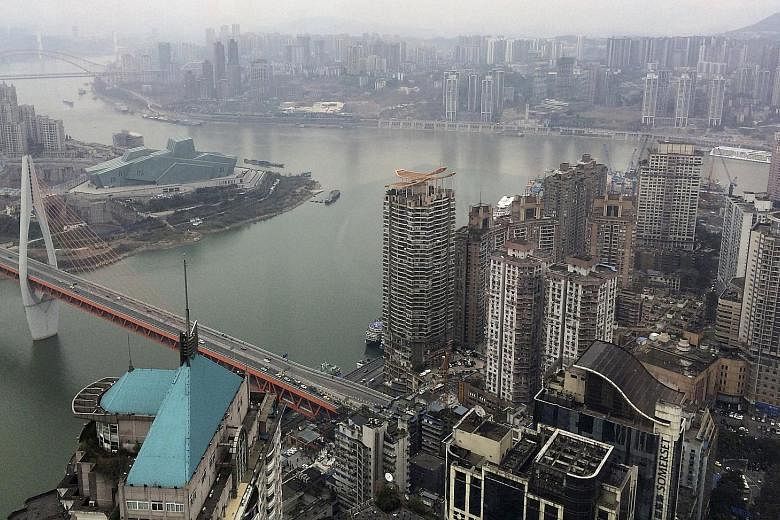CHONGQING • The economic success of the metropolitan area of Chongqing in central China was in the balance following the jailing four years ago of its charismatic Communist Party chief Bo Xilai, a rising star in the political elite.
But the city has continued to thrive, a feat that has some lessons for other local governments and reflects a pragmatic streak in China's leadership in allowing Bo's Chongqing model, and his economic adviser, Mayor Huang Qifan, to survive his fall.
China is trying to transform its giant economy from one led by basic manufacturing to one more reliant on services and consumption, which the government expects to provide more stable growth in the future. A slowdown in growth and slumping stock markets in the past year have raised concerns among investors about Beijing's ability to maintain stability while driving structural reforms.
Chongqing appears to have achieved that balance.
Unlike much of China, it did not shirk the hard decisions, opting early to cut overcapacity in its steel sector and investing heavily to move up the value chain from lower-end manufacturing to electronics, biomedical products and high-tech equipment.
Under Bo, Chongqing became one of China's fastest-growing regions, helped by a crackdown on corruption, corporate tax breaks, the pursuit of foreign investment and rapid urbanisation and industrialisation.

And so it remains, chalking up growth of 11 per cent last year, while the national economy slowed to a 25-year low of 6.9 per cent.
While Beijing purged many of Bo's associates, Mr Huang was left in office to oversee that success under the city's new party boss Sun Zhengcai, a man tipped for top national leadership.
Chongqing was blessed with advantages even before Bo and Mr Huang, from its handy location on the Yangtze river and arms manufacturing history in the 1940s, to the central government's decision to make it the fourth municipality in 1997, alongside Beijing, Shanghai and Tianjin, in a push to develop inland regions.
But it did not rest on its laurels.
"I think we can learn from Chongqing's experience about the importance of undertaking industrial upgrading and restructuring," said IHS economist Xu Yating in Beijing.
Policies included a corporate income tax at 15 per cent to develop priority industries in China's west compared with 25 per cent in the country's more developed parts; the first tax-bonded area in inland China, so importers do not pay duties on products until they are sold; incentives for investing in high- tech and green industries; reforms to encourage rural workers into the city; and policies to make more land cheaply available to industry.
The city is now a leading centre of automobile manufacturing, drawing global brands such as Hyundai, Iveco, General Motors and Ford.
One of China's biggest carmakers, Chongqing Changan Automobile, which plans to sell 4.5 million vehicles by 2020, is based there.
Huachen Xinyuan's new auto plant, which mainly supplies the domestic market, is based in nearby Fuling district - once a six-hour boat ride from Chongqing but now just 40 minutes away by high-speed train. That in turn attracted businesses like Haoxiang Machinery. "We moved out here to be closer to Huachen Xinyuan, along with 14 other component suppliers," said Mr Ye Huagang, its boss, over the buzz of jackhammers at his new factory.
Global electronics brands including Hewlett-Packard, Foxconn, Acer and Asus all have operations in Chongqing, lured by tax breaks, cheap labour and land, plus a developed supply chain and logistics. The region makes one in three of the world's laptops.
The vigour of the manufacturing sector has helped develop related technology clusters and attendant finance and logistics services. "There's a very close connection between the development of manufacturing and services," said chief economist Tu Xingyong at the Economic and IT Commission.
Chongqing has not just been successful at attracting inward investment, its firms are outbound investors too, and consular representatives from 10 countries are based in the city.
"We are here mainly to attract Chinese companies that want to invest in Ethiopia and Africa," said Mr Kebede Abera, Ethiopia's consular general to Chongqing.
In the past four years, around 80 Chinese firms have visited Ethiopia, and some, including Chongqing carmaker Lifan and Chongqing Bureau of Geology and Mining Exploration, have invested there.
POLITICAL MESSAGE
Fears that Chongqing might suffer from its connection with Bo, once considered by some as a potential rival for leadership in Beijing, were soothed when President Xi Jinping made his first trip of 2016 to the city.
"This place is full of promise," he said in a speech, looking out over a port connecting railways, waterways and roads along China's new Silk Road linking Asia and Europe, which is also known as the One Belt, One Road project.
That is in part a political calculation. "If Chongqing's economy slowed down, the outside world would think Chongqing can't do without Bo," said a source with ties to the leadership.
As a further sign of favour, Mayor Huang was among half a dozen regional officials picked to join President Xi on his visit to the United States last year.
Mr Huang's next role could well take him to the national stage.
Two sources say he is tipped to become secretary-general of the Cabinet, which would make him Premier Li Keqiang's right-hand man.
"The power he has here, even if it is local, it's a very national-level experiment," said Italy's consul-general to Chongqing Sergio Maffettone. "Chongqing is like a lab for reforms."
REUTERS

